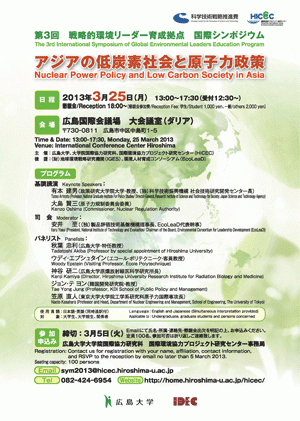Nuclear Power Policy and Low Carbon Society in Asia
The Great East Japan Earthquake that occurred on March 11, 2011 and the subsequent accident at Tokyo Electric Power Company’s Fukushima Daiichi Nuclear Power Station had a huge impact not only on Japan but also on international society. Many countries have held discussions on the revision of their energy policy. In working toward the low-carbon society scenario in Japan, nuclear power technology was expected to play a key role as one of the low-carbon technologies to be used in energy supply, and under the circumstances it became necessary to reexamine the basic energy plan from scratch. In democratic states, national strategy is decided based on the will of the people. However, energy policy and environmental strategy are extremely complicated issues that include a large number of risks, including economic, environmental, and energy security risks. The people of a nation must understand these in a multi-faceted way as long-term issues that include uncertainties, risk avoidance costs and benefits, and must make calm, accurate judgments. As part of this process, an important role and responsibility is held by the scientists who present and explain the scientific facts to the people and the government, as well as the government, which must make policy decisions based on such scientific facts. The key elements of the report developed by the Japan Science and Technology Agency’s Center for Research and Development Strategy regarding the ideal roles and responsibilities that should be fulfilled by the scientific community and the government in the formation and implementation of policy were published in the US journal Science (Science 337: 1176-1177). The report advocated the importance of establishing a forum where various stakeholders may regularly participate, debate and take action on the principles for a code of conduct for scientists and the government in the future, and on the relationship between science and policy/society, in response to the damage done to the Japanese public’s trust in science since the Great East Japan Earthquake.
Program
- Opening address:
- Toshimasa Asahara (President of Hiroshima University)
- Akimasa Fujiwara (Dean of Graduate School for International Development and Cooperation, Hiroshima University)
- Keynote address:
- Tateo Arimoto (Professor, National Graduate Institute For Policy Studies/ Director-General, Research Institute of Science and Technology for Society, Japan Science and Technology Agency)
- Kenzo Oshima (Commissioner, Nuclear Regulation Authority)
- Panel Discussion
- Moderator:
- Itaru Yasui (President, National Institute of Technology and Evaluation/ Chairman of the board, Environmental Consortium for Leadership Development (EcoLeaD))
- Panelists:
- Tadatoshi Akiba (Professor by special appointment of Hiroshima University)
- Woody Epstein (Visiting Professor, École Polytechnique)
- Kenji Kamiya (Director, Hiroshima University Research Institute for Radiation Biology and Medicine)
- Tae Yong Jung (Professor, KDI School of Public Policy and Management)
- Naoto Kasahara (Professor and Head, Department of Nuclear Engineering and Management, School of Engineering, The University of Tokyo)
- Moderator:
- Closing address:
- Shinji Kaneko (Vice Dean of Graduate School for International Development and Cooperation, Hiroshima University)


 Home
Home